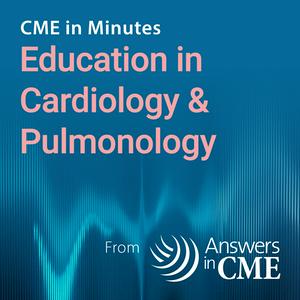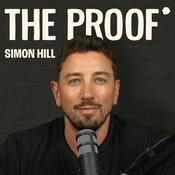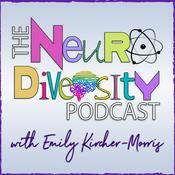CME in Minutes: Education in Cardiology & Pulmonology

71 episodes
Ticiana Leal, MD - Translating Trials to Treatment: Practical Strategies for Immunotherapy Integration in Limited-Stage and Extensive-Stage SCLC
2026/1/08 | 18 mins.Please visit answersincme.com/JRV860 to participate, download slides and supporting materials, complete the post test, and get a certificate. In this activity, an expert in lung cancer discusses the use of immunotherapy in clinical practice for patients with limited-stage (LS) and extended-stage (ES) small-cell lung cancer (SCLC). Upon completion of this activity, participants should be better able to: Recognize the rationale for the use of immune checkpoint inhibitors in LS-SCLC and ES-SCLC; Assess the clinical profiles of approved and emerging immune checkpoint inhibitor therapies for LS-SCLC and ES-SCLC; and Outline evidence-based strategies for incorporating immune checkpoint inhibitor therapy into treatment plans for patients with LS-SCLC and ES-SCLC.Taofeek K. Owonikoko, MD, PhD, MS / Ticiana Leal, MD - New Frontiers in Small Cell Lung Cancer: Getting Ready for the Emergence of B7-H3–Directed ADCs
2025/12/12 | 1h 1 mins.Please visit answersincme.com/860/99097105-replay to participate, download slides and supporting materials, complete the post test, and get a certificate. In this activity, experts in small cell lung cancer (SCLC) discuss the pathophysiologic rationale, emerging clinical evidence, and potential future role for B7-H3–directed antibody-drug conjugates in extensive-stage SCLC. Upon completion of this activity, participants should be better able to: Recognize the rationale for investigating B7-H3–directed antibody-drug conjugates (ADCs) in the treatment of patients with extensive-stage small cell lung cancer (ES-SCLC); Analyze recent clinical trial findings on B7-H3–directed ADCs in patients with previously treated ES-SCLC; and Formulate evidence-based, multidisciplinary team strategies for incorporating B7-H3–directed ADCs into treatment plans for patients with ES-SCLC, as they become available.Nicola Hanania, MD, MS / Surya P. Bhatt, MD, MSPH - Demystifying the Evidence for Biologics in COPD: Strategies for Optimized, Patient-Centered Management
2025/12/11 | 1h 4 mins.Please visit answersincme.com/860/MED-RESP-03658-replay to participate, download slides and supporting materials, complete the post test, and get a certificate. In this activity, experts in pulmonary medicine discuss how to integrate biologics into individualized treatment plans for chronic obstructive pulmonary disease (COPD), featuring insights from a patient advocate. Upon completion of this activity, participants should be better able to: Specify the rationale for targeting eosinophilic inflammation in COPD; Differentiate available and late-stage emerging biologic therapies based on the latest clinical evidence in COPD; Identify patients with COPD who are appropriate candidates for biologic therapy; and Outline strategies to optimally incorporate biologic therapies into treatment plans for patients with COPD.Mark Awad, MD, PhD / Carl M. Gay, MD, PhD - Breaking News in Small-Cell Lung Cancer: Expert Insights on B7-H3–Directed Antibody–Drug Conjugates From Recent Congresses
2025/12/01 | 1h 2 mins.Please visit answersincme.com/860/99224979-replay1 to participate, download slides and supporting materials, complete the post test, and obtain credit. In this activity, experts in oncology discuss the latest data on emerging B7-H3–directed antibody–drug conjugates (ADCs) for the treatment previously treated extensive-stage small-cell lung cancer (ES-SCLC). Upon completion of this activity, participants should be better able to: Specify how B7-H3 overexpression is relevant to ES-SCLC prognosis and treatment; Interpret the clinical evidence for emerging B7H3–directed ADCs in patients with previously treated ES-SCLC; and Translate current evidence and clinical considerations for B7-H3–targeted ADCs into treatment algorithms for patients with ES-SCLC.Luis Paz-Ares, MD, PhD / Lauren Averett Byers, MD - Shaping the Future of SCLC Treatment: Advancing Care Through Innovative Approaches
2025/11/24 | 30 mins.Please visit answersincme.com/860/97851223-replay3 to participate, download slides and supporting materials, complete the post test, and obtain credit. In this activity, experts in lung cancer discuss the latest advances in the treatment of small-cell lung cancer (SCLC), including both extensive-stage and limited-stage disease. Upon completion of this activity, participants should be better able to: Identify clinical factors that drive treatment decision-making for patients with SCLC; and Outline personalized treatment strategies to address key complexities affecting the optimal, real-world management of patients with SCLC.
More Health & Wellness podcasts
Trending Health & Wellness podcasts
About CME in Minutes: Education in Cardiology & Pulmonology
Listen to CME in Minutes: Education in Cardiology & Pulmonology, On Purpose with Jay Shetty and many other podcasts from around the world with the radio.net app

Get the free radio.net app
- Stations and podcasts to bookmark
- Stream via Wi-Fi or Bluetooth
- Supports Carplay & Android Auto
- Many other app features
Get the free radio.net app
- Stations and podcasts to bookmark
- Stream via Wi-Fi or Bluetooth
- Supports Carplay & Android Auto
- Many other app features


CME in Minutes: Education in Cardiology & Pulmonology
download the app,
start listening.



































